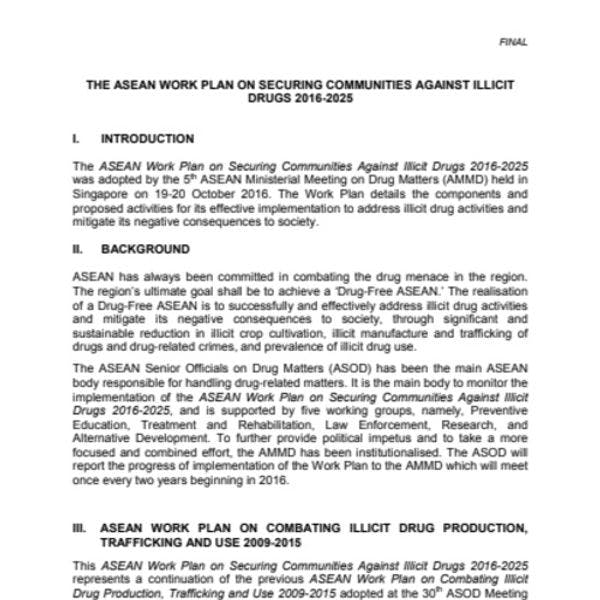The ASEAN Work Plan on securing communities against illicit drugs 2016-2025
ASEAN has always been committed in combating the drug menace in the region. The region’s ultimate goal shall be to achieve a ‘Drug-Free ASEAN.’ The realisation of a Drug-Free ASEAN is to successfully and effectively address illicit drug activities and mitigate its negative consequences to society, through significant and sustainable reduction in illicit crop cultivation, illicit manufacture and trafficking of drugs and drug-related crimes, and prevalence of illicit drug use.
The ASEAN Senior Officials on Drug Matters (ASOD) has been the main ASEAN body responsible for handling drug-related matters. It is the main body to monitor the implementation of the ASEAN Work Plan on Securing Communities Against Illicit Drugs 2016-2025, and is supported by five working groups, namely, Preventive Education, Treatment and Rehabilitation, Law Enforcement, Research, and Alternative Development. To further provide political impetus and to take a more focused and combined effort, the AMMD has been institutionalised. The ASOD will report the progress of implementation of the Work Plan to the AMMD which will meet once every two years beginning in 2016.
This ASEAN Work Plan on Securing Communities Against Illicit Drugs 2016-2025 represents a continuation of the previous ASEAN Work Plan on Combating Illicit Drug Production, Trafficking and Use 2009-2015 adopted at the 30th ASOD Meeting in Phnom Penh, Cambodia in 2009. Aligned with the vision of Drug-Free ASEAN 2015, the ASEAN Work Plan 2009-2015 focused on successfully and effectively addressing illicit drug activities and mitigating its negative consequences to society, which includes significant and sustainable reductions in (i) illicit crop cultivation; (ii) illicit manufacturing and trafficking of drugs and drug-related crimes; and (iii) the prevalence of illicit drug use.
The ASEAN Work Plan 2009-2015 was implemented and annually reported through the ASOD Standardized Country Report. A mid-term review and final assessment were undertaken in 2012 and 2014, respectively, to monitor, review and evaluate the progress of implementation of the ASEAN Work Plan 2009-2015. The mid-term review for a Drug-Free ASEAN 2015 concluded that whereas ASEAN’s commitment to combating illicit drugs remains resolute and there are significant achievements, challenges are still prevalent and new threats are emerging. Therefore, the Review recommended that a strong effort in both supply and demand reduction still need to be undertaken.
The final assessment to monitor, review and evaluate the implementation progress of the ASEAN Work Plan 2009-2015 was conducted by the United Nations Office for Drugs and Crime (UNODC) in 2014. The outcomes were reflected in the “Drug Free ASEAN 2015: Evaluation and Recommendations Post-2015” report. The Report discovered that the drug situation in the region is worsening due to the reported proliferation of methamphetamine and new psychoactive substances (NPS). The Report concluded that the governments of the ASEAN Member States need a more holistic approach to overcome the challenges posed by illicit drug trafficking. The Report underlined the importance for the ASEAN’s drug agencies and authorities to evolve from a one-dimensional control approach to multi-dimensional management approaches.
The new Work Plan has taken into account the above-mentioned report and its recommendations.
Keep up-to-date with drug policy developments by subscribing to the IDPC Monthly Alert.
